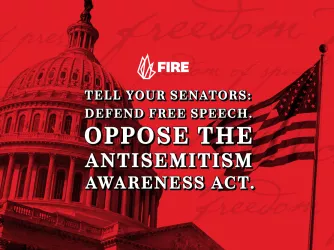Table of Contents
The Justice Department’s new social media policies look promising for free speech

Amanda Andrade-Rhoades / USA TODAY NETWORK
CEO and founder of Facebook and its parent company Meta, Mark Zuckerberg listens to questions during a Senate Judiciary Committee hearing on Jan. 31, 2024.
On Aug. 9, FIRE published an analysis of the U.S. Department of Justice’s information-sharing efforts around what the agency calls “foreign malign influence threats to U.S. elections.” The information provided at the time didn’t shed as much light as we would have liked on the specifics regarding the DOJ’s interaction with social media companies, but what we were able to see appears to be a step in the right direction for preserving free speech online.
The DOJ did promise to release more information in the weeks following that report, and to the department’s credit, they’ve made good on it. In addition to releasing a summary of its standard operating procedures earlier in the summer, the DOJ has now outlined its overall strategy for engaging with social media on these particular threats. Combined, these releases allow us to see more clearly how the DOJ intends to engage with social media companies regarding “foreign malign influence” threats.
One very positive aspect is the DOJ’s explicit acknowledgment of and stated interest in preserving free speech. The DOJ says that sharing information with social media companies is “critical” to combating foreign malign influence threats, but the agency explicitly notes that they must protect First Amendment rights in the process: “As we work to counter those who seek to exploit online platforms and undermine our democracy, we must — and will — preserve the very freedoms at the core of that democracy.”
To this end, the policies explain that when sharing threat information with social media companies, the DOJ’s communications with the company should clearly communicate two critically important points:
- The DOJ is “not asking the company to take any action in response to the sharing of the information, and the company has no obligation to do so.”
- The DOJ “will not take any adverse action based on the company’s decision about whether or how to respond to the information being shared.”
Perhaps most importantly, the DOJ emphasizes transparency in its dealings with social media companies, and explicitly notes that all interactions are voluntary — something FIRE has long advocated for.
As we mentioned in our commentary on Murthy v. Missouri, there is a major risk to free speech when the government operates in the background, unseen, and tries to manipulate social media companies' policies to suit their desired ends. FIRE acknowledges that there can be good reasons for the government and social media platforms to speak to each other. But when they do so, these interactions should be fully transparent and voluntary in order to prevent hidden and unreviewable censorship.
The DOJ’s outlined policies appear to accept these essential premises, noting that even where it has an interest of the highest order, such as national security and the integrity of elections, it must engage with social media companies in a way that is consistent with American constitutional protections and values.
It’s nice to see the DOJ endorse transparency, though we want to require it — not just for the DOJ’s protocols, but for the communications themselves.
FIRE will be keeping a close eye on these developments from the DOJ — but if they really believe in transparency and protecting free speech, they should support our model bill.
That’s why FIRE drafted model legislation called the Social Media Administrative Reporting Transparency Act, or “SMART” Act, which would legally require the government to disclose its communications with social media companies about moderating content. If adopted, the bill would require the federal government to disclose when federal employees contact social media companies regarding content published on their platforms. Such disclosure would bring to light the full universe of government demands to social media companies.
Even with the DOJ’s stated commitment to transparency and voluntary engagement, there is still reason to be concerned about how systematic interactions between government actors and social companies play out in real life, and to recognize the subtle pressures they could have under the DOJ’s proposed approach. Even if the actions are not explicitly coercive, the government may still exert pressure in various ways that could compromise true editorial freedom.

The Supreme Court, Big Tech, and the dark art of politics
News
Will the Court upend First Amendment protections for social media platforms in NetChoice v. Paxton? Let’s hope not.
If, as the DOJ says, sharing information with social media companies is “critical to fighting foreign malign influence,” it raises the question of just how voluntary these interactions are, or will be, in circumstances where the DOJ determines that the threat level is too high.
The power and pressure the government can exert on these companies, otherwise known as “jawboning,” can feel very much like your boss asking you to stay late at work: It sounds like a request, but it isn’t one. And while a stated commitment to principles of free speech, transparency, and voluntary cooperation by a government agency is a heartening development, it oftentimes isn’t enough to truly secure our freedoms.
As always, FIRE will be keeping a close eye on these developments from the DOJ — but if they really believe in transparency and protecting free speech, they should support our model bill.
Recent Articles
FIRE’s award-winning Newsdesk covers the free speech news you need to stay informed.

Iranian agents accused of attempted assassination on U.S. soil — again

Alumni take action at Macalester College

FIRE statement on congressional leaders smuggling unconstitutional Antisemitism Awareness Act into a must-pass defense bill


